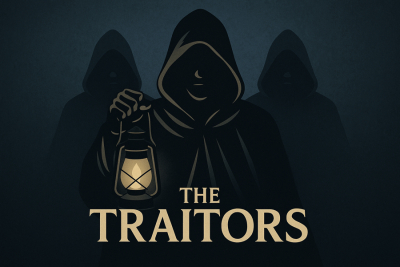The BBC television programme Traitors has gripped the nation once again, combining psychological tension, strategy, and social politics in a way that only reality TV can. This has been heightened in the celebrity version because it’s people we know something about. But behind the drama of cloaks, clandestine gatherings and banishments lies a fascinating study in leadership, group dynamics, and human behaviour; lessons every manager and business leader could learn from.
At first glance, the game is simple: a group of “Faithful” contestants must identify and eliminate the hidden “Traitors” in their midst. Yet, just like in many workplaces, the absence of clear leadership and direction quickly leads to confusion, mistrust, and misplaced priorities.
In Celebrity Traitors, leadership is informal. No one is officially in charge, but everyone wants influence. Contestants naturally step up, trying to steer discussions, coordinate votes, or promote group harmony. Yet many hesitate, fearing that standing out might make them a target. In the show’s context, either option may result in being “murdered” by the Traitors overnight.
In the workplace, it’s not quite so dramatic, but the same pattern often emerges. In teams where leadership isn’t clearly defined, people hold back. Potential leaders self-censor for fear of conflict, being undermined, being perceived as too assertive or even intimidating. The result? A vacuum of authority where uncertainty thrives, progress stalls, and individuals are ‘in it’ for themselves.
When nobody takes ownership of direction or decision-making, objectives become blurred. Everyone’s working hard, but not necessarily together. Does any of this sound familiar?
Another interesting element of The Traitors is how heavily participants rely on body language. As suspicions grow, subtle gestures such as crossed arms, nervous fidgeting and forced smiles become sources of interpretation and often mis-interpretation. Faithful contestants often try to “signal” their innocence through exaggerated behaviour, over-smiling or speaking in overly calm tones, desperate to communicate that they are trustworthy.
It’s a fascinating reflection of the workplace. Managers and colleagues constantly read non-verbal cues: who’s engaged, who’s defensive, who’s hiding frustration or insecurity. But just as in The Traitors, those signals can be misleading. Overcompensating behaviour, nervous energy, or simply poor communication skills can create false perceptions, leading to poor judgements and decisions, misplaced trust, and unnecessary conflict.
Effective leaders know to look beyond body language. They combine empathy with objectivity; asking questions, observing patterns, and avoiding snap judgments. They understand that authentic communication, not guesswork, is the foundation of trust.
The “Traitors” themselves are fascinating from a leadership psychology perspective. They rarely need to take overt action to cause chaos. A quiet word, a subtle nudge, or a well-timed question is often enough to seed doubt and turn allies against each other.
In business, the same dynamic can occur. Not through malice necessarily, but through the absence of clarity. When leaders fail to set clear expectations, communicate strategy, or align their teams around shared and common goals, uncertainty will creep in. Minor misunderstandings grow into major disputes, and once cohesion is lost, productivity soon follows suit.
In The Traitors, this uncertainty is the traitors’ greatest weapon. In a workplace, it’s the silent killer of engagement and morale.
The truth is, there’s no guaranteed sustainable success, whether that’s in a castle or in a business, without clear, capable leadership. Defined roles, measurable objectives, and confident decision-making create stability, purpose, and trust. People follow leaders not because they have to, but because they believe in their competence and integrity.
Without it, even the most talented teams descend into finger-pointing and confusion, just like the Faithfuls turning on each other at the Round Table.
At HR Champions Ltd, we understand just how vital strong leadership is. Our ILM-accredited Leadership and Management courses equip managers with the tools, confidence, and mindset to lead effectively. Not just to make decisions, but to inspire others to follow them. We also offer targeted training in communication, conflict management, and emotional intelligence; the real-world skills that keep teams cohesive and productive.
Whether you’re in a boardroom or in a castle in the Scottish Highlands, clarity, confidence, and communication win the game every time.
Don’t Be a Traitor to Your Employees or your organisation; invest in proper, recognised training that produces positive outcomes. Contact HR Champions Ltd today to discover how our ILM and Leadership Development programmes can turn your managers into true leaders, the kind your teams will trust, follow, and respect. Call us on 01452 331331, or complete the contact form.



